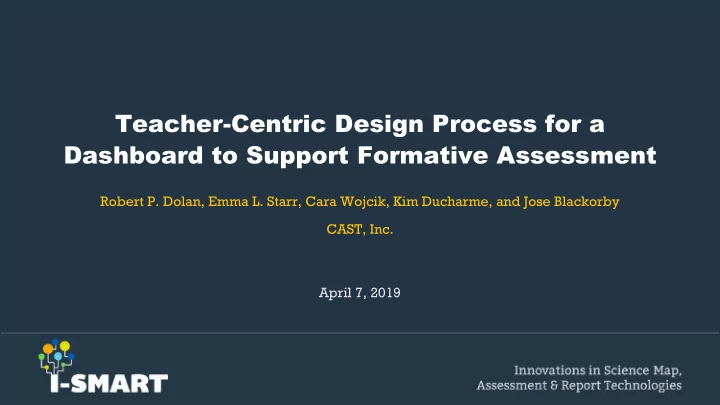

Teacher-Centric Design Process for a Dashboard to Support Formative Assessment Robert P. Dolan, Emma L. Starr, Cara Wojcik, Kim Ducharme, and Jose Blackorby CAST, Inc. April 7, 2019
Agenda Project Background • Brief Introduction to Universal Design for • Learning Teacher Dashboard Co-Design Methodology • Design Findings • Next Steps •
But first … a (loaded) question If a “formative” assessment is administered but its results aren’t used to inform subsequent instruction, is it formative?
Project Background
I-SMART Enhanced Assessment Grant Four year project 2017-2020 • MD (lead), MO, NJ, NY OK • KU ATLAS + CAST + BYC • Builds from previous dynamic learning map • (DLM) efforts in ELA, math & science
I-SMART Key Factors • Deeply integrates the UDL guidelines into the instructionally embedded test design and development process • Supports students with significant cognitive disabilities and students with and without disabilities who are struggling to meet grade-level expectations in science • Designed for summative and formative use • Provides a new, actionable dashboard to support teacher use of test results to inform instructional decision making, co-designed with teachers through a UDL lens
Learning Map Models
The problem Teachers are swimming (drowning) in student data, too often presented in unusable & non- actionable ways. How can we make data displays—and the way they are used—more empowering and effective for teachers?
The approach Apply UDL to co-design with teachers an interface that supports their leveraging of learning map models in using student test results for instructional decision-making
Brief Introduction to Universal Design for Learning
Universal Design for Learning (UDL) A framework for embedding options and supports into curricula and learning experiences to expand learning opportunities for all learners
Access Build Internalize
Dashboard Development
Teacher Co-Design Cadres Main Cadre: • 11 educators from four DLM partner states • 4 sets of meetings Meetings of 1-5 cadre members, 2-4 I-SMART team members • 90 minutes • Video conferencing • Gen Ed Focus Group: 1 meeting • Same format as above • 2 gen ed science teachers (grades 6 & 8) from a MA school •
Cadre Participants
Cadre Participants
Iterative Discovery / Design Process: Cadre Meetings 1-3 • Recap of the previous design’s principal elements and features • Walk-through of newly introduced screens and functions spotlighting design solutions resulting from teacher-generated feedback • Facilitated discussion of prototype focusing on areas of clarity/confusion, features to change/add, most/least useful functions, and “Five Ws” Cadre Meeting 4 • “Scavenger Hunt” usability testing session - teachers completed usability tasks to uncover any areas needing further refinement • Cadre process reflection
Iterative co-design cycles
Iterative co-design cycles
Iterative co-design cycles
Test results: class overview
Test results: student overview
Test results: detail view by class
Summary of Design Findings Teachers found the learning maps valuable for understanding • student progress and supporting instructional decisions However, scaffolding teacher’s use of the map is necessary; • there is a learning curve that can be supported through multiple representations of the same data Necessary to include aggregate view of class data to meet • teachers’ instructional needs
Final Cadre Findings In final usability/interpretability testing, cadre members • were able to complete tasks effectively • Feedback from cadre about final design was positive In final reflection, cadre members reported that they felt • positive about the process, including that their ideas were used and that they developed professionally through participating
Next Steps
Upcoming Research Study • Pilot study of science assessment system in 2020 Including evaluation of teacher dashboard through … • • Interpretability and usability studies • Teacher interviews and focus groups
Thank you For more information: bdolan@cast.org
Recommend
More recommend